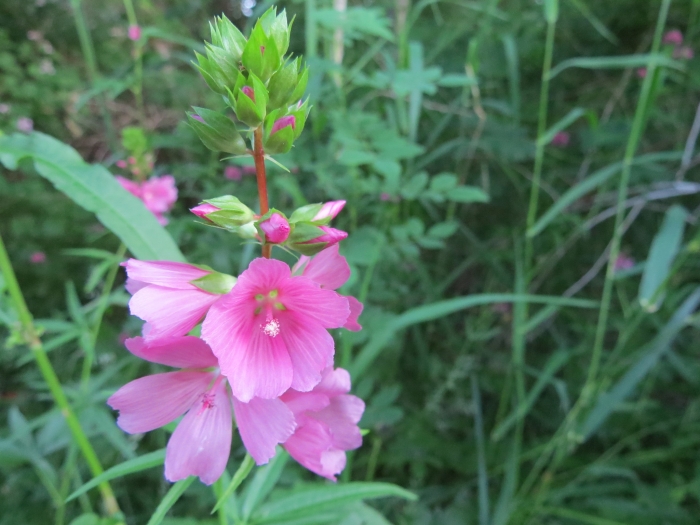Henderson’s Checker-Mallow
(Sidalcea hendersonii)
Henderson’s Checker-Mallow (Sidalcea hendersonii)
/
/

© Jack Bindernagel
CC BY 4.0
Image By:
© Jack Bindernagel
Recorded By:
Copyright:
CC BY 4.0
Copyright Notice:
Photo by: © Jack Bindernagel | License Type: CC BY 4.0 | License URL: http://creativecommons.org/licenses/by/4.0/ | Uploader: jbindernagel | Publisher: iNaturalist |

























Estimated Native Range
Summary
Sidalcea hendersonii, commonly known as Henderson’s checker-mallow, is a perennial herb in the mallow family, native to moist meadows, tidal marshes, and wetland edges in the Pacific Northwest, including southern Oregon, Vancouver Island, and mainland British Columbia. This species was named in honor of Oregon botanist Dr. Louis Forniquet Henderson. It typically grows to a height of 2-4 feet (0.6-1.2 meters) with a similar spread. Henderson’s checker-mallow has a basal rosette of toothed leaves and erect, hollow stems that are often tinged purple. From late spring to midsummer, it produces showy, five-petaled, pink to lavender flowers that form in branched racemes, attracting pollinators such as bees and butterflies. The flowers give way to capsular seed fruits with 5 to 10 chambers, each containing one seed.
Henderson’s checker-mallow is valued for its ornamental qualities, including its attractive foliage and flowers. It is suitable for rain gardens, native plant gardens, and restoration projects due to its preference for wet conditions and its ecological role in supporting native pollinators. In cultivation, it thrives in full sun to part shade and requires consistently moist to wet soil, ideally mimicking its natural wetland habitat. While it is not commonly found in the horticultural trade, it can be a unique addition to a garden with the right conditions. Due to its specific habitat requirements, it is not prone to becoming invasive. However, it is considered at risk in the wild, with habitat loss being a significant threat to its populations.CC BY-SA 4.0
Henderson’s checker-mallow is valued for its ornamental qualities, including its attractive foliage and flowers. It is suitable for rain gardens, native plant gardens, and restoration projects due to its preference for wet conditions and its ecological role in supporting native pollinators. In cultivation, it thrives in full sun to part shade and requires consistently moist to wet soil, ideally mimicking its natural wetland habitat. While it is not commonly found in the horticultural trade, it can be a unique addition to a garden with the right conditions. Due to its specific habitat requirements, it is not prone to becoming invasive. However, it is considered at risk in the wild, with habitat loss being a significant threat to its populations.CC BY-SA 4.0
Plant Description
- Plant Type: Herb
- Height: 2-4 feet
- Width: 1-2 feet
- Growth Rate: Moderate
- Flower Color: Pink
- Flowering Season: Spring, Summer
- Leaf Retention: Deciduous
Growth Requirements
- Sun: Full Sun
- Water: Medium
- Drainage: Medium
Common Uses
Bee Garden, Bird Garden, Border Plant, Butterfly Garden, Deer Resistant, Low Maintenance, Potted Plant, Water Garden
Natural Habitat
Moist meadows, tidal marshes, and wetland edges
Other Names
Common Names: Henderson’s Checker Mallow, Henderson’s Sidalcea, Mallow
Scientific Names: , Sidalcea hendersonii,
GBIF Accepted Name: